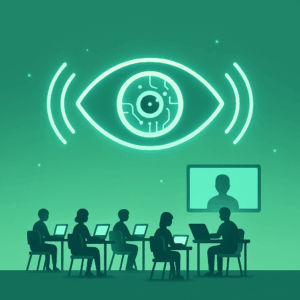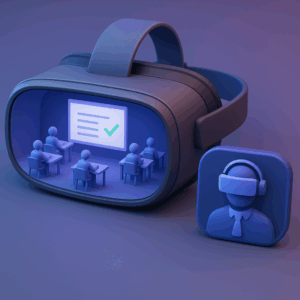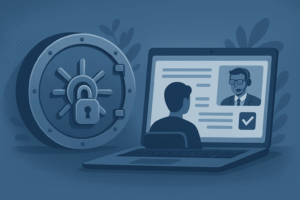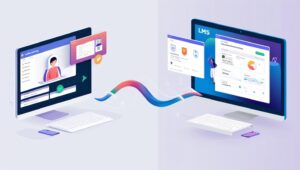In today’s tech-driven educational landscape, academic integrity faces unprecedented challenges. With the rise of online learning and digital assessments, opportunities for cheating have increased, prompting institutions to seek advanced solutions. Artificial Intelligence (AI) emerges as a game-changer, offering innovative tools to detect, deter, and prevent cheating. Educators can ensure fairness by integrating AI into modern learning setups while leveraging its potential for personalized and effective teaching. This blog delves into how AI-enabled solutions combat academic dishonesty and their role in shaping ethical learning environments.
AI in Modern Learning: Revolutionizing Assessment Integrity
AI has redefined education by introducing smart technologies to secure assessments. Here’s how:
- Proctoring with Precision: AI-powered proctoring tools monitor exams through facial recognition, gaze tracking, and behavior analysis to flag suspicious activities.
- Plagiarism Detection: Advanced AI tools like Turnitin use deep learning algorithms to detect unoriginal assignment content, ensuring authentic student submissions.
- Real-time Behavior Analysis: Machine learning models evaluate test-taker actions, such as eye movement or unusual keyboard activity, enhancing fraud detection during exams.
Through these capabilities, AI establishes a robust defense against cheating, upholding the credibility of digital assessments.
Cheating Tactics and How AI Counteracts Them
As students develop creative ways to bypass rules, AI evolves to address these tactics effectively:
- Hidden Devices: Modern cheating methods, from earphones to mini cameras, involve technology. AI-enabled cameras detect unauthorized devices, ensuring exam security.
- Text Generators: Students craft essays using AI-powered text generation tools like ChatGPT. Counteracting this, AI plagiarism detectors can identify AI-written content.
- Collusion Prevention: AI-driven solutions monitor group dynamics in classrooms or virtual settings, identifying patterns that suggest collaborative cheating.
By adapting these methods, AI maintains its edge in preventing academic misconduct.
Ethical Implications of AI in Education
While AI significantly reduces cheating, its integration raises ethical concerns:
- Privacy Matters: AI-powered surveillance tools require collecting personal data, raising questions about data security and student privacy.
- Bias in AI Systems: Algorithms can unintentionally exhibit bias, misidentifying behavior based on cultural or neurological differences. Addressing such biases is crucial.
- Balancing Trust and Control: Over-reliance on AI could foster a culture of mistrust. A balanced approach emphasizing education over punishment is essential.
Institutions must adopt transparent policies and invest in ethical AI practices to foster trust and acceptance among students and educators.

How AI-Powered Proctoring Can Save Integrity in Modern Classrooms
Ensuring academic integrity has become a pressing concern in the digital education age. With the shift to online learning, traditional methods of monitoring exams are no longer sufficient to combat evolving cheating tactics. AI-powered proctoring emerges as a transformative solution, safeguarding the integrity of modern classrooms.
AI-driven tools use advanced technologies such as facial recognition, behavior analysis, and audio detection to monitor exams in real time. These systems can identify anomalies, such as unauthorized devices, suspicious gaze patterns, or unexpected sounds, providing a level of scrutiny unmatched by human invigilators alone. By automating surveillance, AI reduces human errors, biases, and fatigue, ensuring a fair and consistent evaluation process.
Moreover, AI proctoring doesn’t just detect dishonesty—it deters it. Knowing that an AI system can monitor and flag potential misconduct discourages students from attempting to cheat, fostering a culture of honesty. This technology also offers scalability, making it feasible for institutions to conduct secure assessments for large numbers of students, irrespective of location.
However, implementing AI-powered proctoring requires ethical considerations. Institutions must prioritize transparency, ensuring students understand how their data is used and protected. By addressing concerns about privacy and system biases, AI proctoring can gain widespread acceptance and trust.
Summing up
AI-enabled solutions are revolutionizing education by offering innovative tools to uphold academic integrity in modern learning setups. AI has become indispensable in maintaining fairness, from real-time proctoring and plagiarism detection to countering sophisticated cheating tactics. However, its implementation must be ethical and transparent, addressing concerns about privacy and bias. As education evolves, the synergy between technology and ethical practices will define the future of learning, ensuring that innovation empowers rather than undermines academic integrity.











